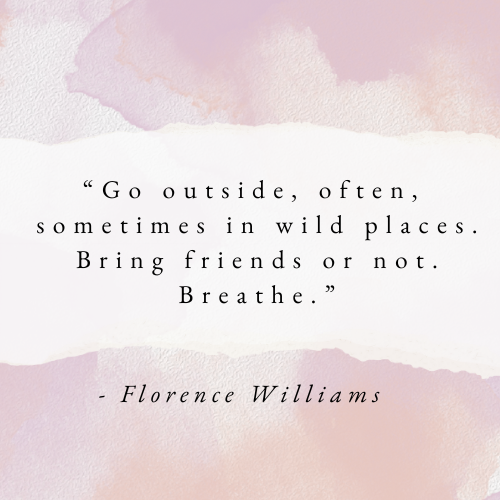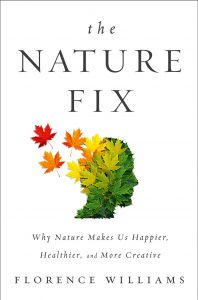Words of Wisdom from The Nature Fix: Why Nature Makes Us Happier, Healthier, and More Creative by Florence Williams

Intuitively, I think we all know there are benefits from spending time in nature. However, I didn’t realise how detrimental an urban life with limited time in nature could be to our physical and mental health until I read The Nature Fix: Why Nature Makes Us Happier, Healthier, and More Creative by Florence Williams.
Packed with stats from numerous studies and research projects, Florence makes a strong case for the benefits of spending as much time in nature as possible. In a world focused on urban development, this book couldn’t be more timely. This book serves as an essential reminder that our future existence and wellbeing is subject to our exposure to nature. Here are the juicy bits >>
1. There are many benefits for spending time in nature
“Here are some of the essential take-homes: we all need nearby nature: we benefit cognitively and psychologically from having trees, bodies of water, and green spaces just to look at; we should be smarter about landscaping our schools, hospitals, workplaces and neighborhoods so everyone gains. We need quick incursions to natural areas that engage our senses. Everyone needs access to clean, quiet and safe natural refuges in a city. Short exposures to nature can make us less aggressive, more creative, more civic minded and healthier overall. For warding off depression, lets go with the Finnish recommendation of five hours a month in nature, minimum. But as the poets, neuroscientists and river runners have shown us, we also at times need longer, deeper immersions into wild spaces to recover from severe distress, to imagine our futures and to be our best civilized selves.”
2. Nature coda
“Distilling what I learned, I came up with a kind of ultrasimple coda: Go outside, often, sometimes in wild places. Bring friends or not. Breathe.”
3. When in doubt, go for a walk
“The idea of solvitur ambulando (in walking it will be solved) has been around since St. Augustine, but well before that Aristotle thought and taught while walking the open-air parapets of the Lyceum. It has long been believed that walking in restorative settings could lead not only to physical vigor but to mental clarity and even bursts of genius, inspiration (with its etymology in breathing) and overall sanity. As French academic Frederic Gros writes in A Philosophy of Walking, it’s simply “the best way to go more slowly than any other method that has ever been found.” Jefferson walked to clear his mind, while Thoreau and Nietzsche, like Aristotle, walked to think. “All truly great thoughts are conceived while walking,” wrote Nietzsche in Twilight of the Idols. And Rousseau wrote in Confessions, “I can only meditate when I am walking. When I stop, I cease to think; my mind only works with my legs.”
4. The benefits of trees
“A 2014 study estimated that trees in the United States remove 17.4 million tons of air pollution per year, providing 6.8 billion dollars in human health benefits.”
5. Urban living can be detrimental to our mental health
“More recent research shows that the steady stress of urban living changes the brain in ways that can increase our odds of schizophrenia, anxiety and mood disorders.”
6. Humans have, and always will be entwined with nature
“The biophilia hypothesis posits that peaceful or nurturing elements of nature helped us regain equanimity, cognitive clarity, empathy and hope. When love, laughter and music weren’t around, there was always a sunset. The humans who were most attuned to the cues of nature were the ones who survived to pass on those traits.”

